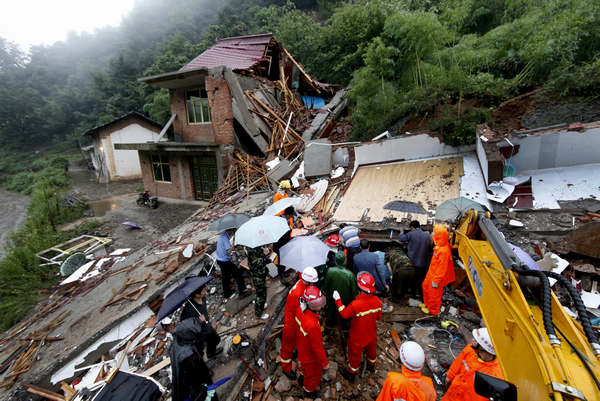Society
New round of heavy rain claims seven more lives
Updated: 2011-06-16 08:02
By Zheng Jinran (China Daily)
|
 Firefighters carry out rescue work in a village hit by landslides triggered by rainstorms in Ningguo city of Anhui province on Wednesday. Two villagers were killed in the accident. [Photo / Xinhua] |
BEIJING - The floods in Central and South China have killed another seven people and left seven more missing during the past three days, the government said on Wednesday.
Heavy rains that have lashed several southern regions since Monday have forced about 88,000 people in six provinces to leave their homes, the Ministry of Civil Affairs said.
Floods since the beginning of June had left more than 170 people dead or missing in Zhejiang, Jiangxi, Hubei, Hunan, Sichuan and Guizhou provinces.
Provinces along the middle and lower reaches of the Yangtze River had received 30 to 50 percent more rainfall than in the same period last year, said Zhang Peiqun, assistant chief engineer of the National Climate Center.
"It's all about the weather. We have no way to change it," Hu Xianqing, a farmer from Shagang village of Yueyang city in Hunan province, told China Daily on Wednesday.
His village experienced severe drought in May, when local reservoirs and lakes were almost empty. "All my 27 hectares of rice were dried up. We can even put fingers between the clefts in the ground," Hu recalled.
However, his farmland was now covered with water up to 4 centimeters deep after heavy downpours hit the village. "Some lower parts of my farmland were inundated by the floods. The rice harvest will be much smaller, that's for sure," Hu said. The farmer added the village's once-dry lake, Xiaojiang Lake, was now overflowing.
More than 72,000 people were evacuated from their homes in East China's Jiangxi and Zhejiang provinces, which since Tuesday have been hit by a new round of rainstorms.
According to the Jiangxi Provincial Flood Control and Drought Relief Headquarters, torrential rains from Tuesday morning have pounded 25 counties and cities in the province.
By Wednesday afternoon, the rain had forced the evacuation of 70,100 people in Jiangxi and toppled 1,320 houses, said a spokesman with the headquarters.
Rescuers in the worst-hit city of Dexing are racing to relocate 5,200 people trapped by floods to safe places, said the spokesman.
The meteorological station predicted that the rain would continue, exceeding 50 millimeters of accumulated rainfall in the provincial capital of Nanchang, Shangrao city and Jingdezhen city.
In Zhejiang, heavy rains since Tuesday have forced the evacuation of 2,059 people in 17 counties, where 79 houses were toppled and 2,370 hectares of farmland damaged, said Liu Fayuan, deputy director of the provincial flood control and drought relief headquarters.
The downpours resulted in a landslide in Qiandaohu town, where a row of warehouses was buried at about 1:34 pm on Wednesday. One person was trapped for four hours before being rescued.
In the southwestern Chongqing municipality, where the heaviest daily rainfall reached 104.2 mm, since Monday more than 110,000 people have been affected by the downpours.
The rains toppled 120 houses, inflicting a direct economic loss of 55.5 million yuan ($8.56 million). No casualties have been reported.
Sun Jun, chief weatherman with the National Meteorological Center, told People's Daily that the sudden change from drought to flood in those areas was due to changes in atmospheric circulation.
Strong warm air from the Bay of Bengal met weak cold air from the Tibetan Plateau around the middle and lower reaches of the Yangtze River, bringing heavy rainfall.
The water levels of more than 20 minor rivers, including branches of Xiangjiang River in Hunan and Qiantang River in Zhejiang, had exceeded the warning line by 0.05 meters to 4.03 meters, according to the State Flood Control and Drought Relief Headquarters in Beijing.
Xinhua contributed to this story.

Specials

When two are one
After a separation of 360 years, Huang Gongwang's famous Dwelling in the Fuchun Mountains has been made whole again.

Wealth of difference
Rich coastal areas offer contrasting ways of dealing with country's development

Seal of approval
The dying tradition of seal engraving has now become a UNIVERSITY major



